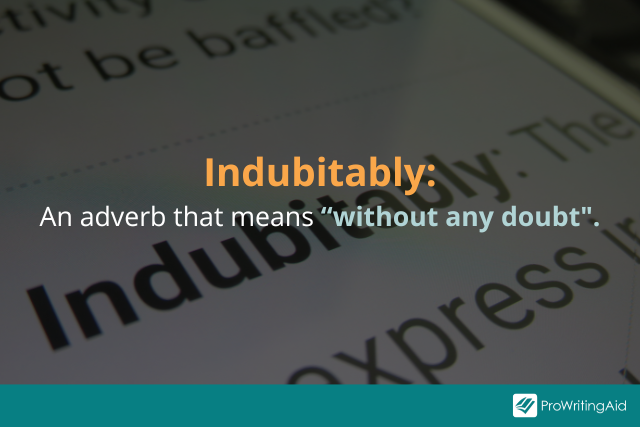
Using rare words like indubitably can help make your writing sound more sophisticated.
So what does indubitably mean, and how do you use it in a sentence?
Essentially, indubitably is an adverb that describes something that is beyond doubt. You can use it in a sentence to express that you’re absolutely certain that something is true.
This article will explain the meaning of indubitably in more detail and show you examples of how you can use it in your writing.
Indubitably Definition
Indubitably is an adverb that means “without any doubt.” It’s the adverb form of the adjective indubitable, which means the same thing.
Related words include undoubtedly, doubtless, and positively.
Indubitably Meaning
We use the word indubitably to show that we’re completely sure something is true.

We have many words in the English language to express a level of certainty. One way to understand what indubitably means is to imagine these words on a spectrum, ranging from least certain to most certain.
On the lower end of this spectrum, we have words like maybe and possibly.
In the middle, we have words like probably and presumably.
On the high end of the spectrum, we have words like certainly and definitely.
Indubitably is one of the very highest words on the scale—it expresses certainty without any doubt.
For example, if you say, “Einstein was probably clever,” you’re expressing some doubt in Einstein's intelligence.
On the other hand, if you say, “Einstein was indubitably clever”, that means you’re absolutely certain of his intellect.
Here are some more examples:
- Beyonce is indubitably fashionable.
- These are all indubitably true facts.
- Our relationship is indubitably past repair.
- This hard cider is indubitably alcoholic.
Origin of Indubitably
The word indubitably first appeared in the English language sometime in the 15th century.
It originates from the Latin word indubitabilis, which is composed of the root in- (meaning “not”) and dubitabilis (meaning “open to doubt or question”).
Examples of Indubitably in a Sentence
The best way to learn how to use a word is by seeing it in action. Let’s look at some examples of indubitably in sentences from English literature.
“Having learnt from experiment and argument that a stone falls downwards, a man indubitably believes this, and always expects the law he has learnt to be fulfilled.”—Leo Tolstoy, War and Peace
“The charming landscape which I saw this morning, is indubitably made up of some twenty or thirty farms. Miller owns this field, Locke that, and Manning the woodland beyond. But none of them owns the landscape.”—Ralph Waldo Emerson, Nature
“How shall I typify what happened? Passion play? Somewhat. Weird tale? Indubitably. Horror story? Pretty close. Grotesque melodrama? Certainly. Black comedy? Your point of view will determine that.”—Richard Matheson, Now You See It
“I hate sentences that begin with my name followed by the claim—indubitably erroneous—that the speaker knows something about me.”—Karen Marie Moning, Burned
“If you live your life for the sole purpose of seeking the approval of others, you will live no life at all. You will indubitably fail, for if that person cannot appreciate you for who you are, then he or she will never truly appreciate you at all.”—Kel Kade, Reign of Madness
“It was a strange staging for death, for the woman on the high bed was dying. Slowly, fighting every inch of the way with a grim tenacity, but indubitably dying.”—John Buchan, The Path of the King
“Organic life, we are told, has developed gradually from the protozoon to the philosopher; and this development, we are assured, is indubitably an advance. Unfortunately, it is the philosopher, not the protozoon, who gives us this assurance.”—Bertrand Russell, Mysticism and Logic
“Needless to say, nobody questioned this theory, and, in truth, accepted it as an indubitably accurate fact.”—Lucy Carter, Logicalard Fallacoid
There you have it—a complete guide to the word indubitably!
Keep reading ProWritingAid articles, and your writing will indubitably improve.


